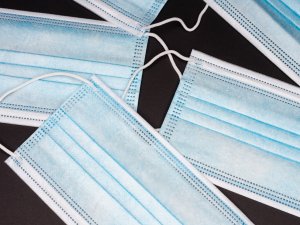Respiratory physician Lutz Beckert considers chronic obstructive pulmonary disease management, including the prevention of COPD, the importance of smoking cessation and pulmonary rehabilitation, and the lifesaving potential of addressing treatable traits. He also discusses the logic of inhaler therapy, moving from single therapy to dual and triple therapy when indicated, as well as other aspects of management
The GPs who continue to mask: A mixed response on dropping of requirements – some GPs alarmed
The GPs who continue to mask: A mixed response on dropping of requirements – some GPs alarmed

Kia ora, please enjoy our Summer Hiatus selection of stories and comment from throughout 2023, curated by our editorial team. This article was first published on 30 August. We will be back from our summer break on 15 January. Happy reading
Chosen by Zach: As a person with a disability, it was really meaningful to shed light on the impact of this decision on others in the community. It was also interesting that those in primary care see the continued value of mask wearing in clinical settings for more than just COVID
My colleagues are going to maintain a strong encouragement for everybody to wear masks in clinical settings
Continued mask use should be normalised and encouraged now that the Government has ended COVID-19 restrictions, says RNZCGP medical director Luke Bradford.
The college has received a mixed response from GPs to the dropping of requirements, says Dr Bradford, who considers the move somewhat inevitable although also premature in winter.
Some GPs are quite alarmed by the removal of the necessity for masks and self-isolation, he says.
However, he adds: “We also want to avoid practices getting into open conflict with their patients and dissuading them from seeking care when… necessary.”
Practices can put in place other measures to keep patients safe, and the college has sent guidance to members recommending respiratory and non-respiratory patients continue to be separated where possible.
"A valuable learning from COVID was that we can avoid mixing infectious patients with non-infectious in the waiting rooms and we would recommend that continues,” Dr Bradford says.
In its guidance, the college says the decision to wear or remove masks in the consultation room will be up to the patient and the clinician.
Pinnacle medical director and specialist GP Jo Scott-Jones says, as far as he and many colleagues are concerned, “nothing has changed [regarding] the infectious disease control process in primary care settings”.
Dr Scott-Jones says the consensus among his colleagues is they don’t want to get COVID, and they don’t want their staff or patients to contract it either.
“They’re going to maintain a strong encouragement for everybody to wear masks in clinical settings,” he says.
“I think [RNZCGP’s] statement on this is really pragmatic and pretty clear and it aligns with what the Ministry of Health has said as well.”
In a statement to New Zealand Doctor Rata Aotearoa, health minister Ayesha Verrall says the public health risk from COVID-19 is now considered low compared to other stages of the pandemic and “it’s safe to remove the final requirements”. Dr Verrall, in the statement, advises people to continue wearing masks to prevent the spread of COVID and other respiratory illnesses, and says in places where leadership can decide their own policies, staff should conduct a risk assessment to work out the most appropriate measures when providing treatment.
Te Whatu Ora’s website states it will gradually stop providing practices with PPE from 1 October and includes a list of when each item is due to be discontinued.
Dr Scott-Jones says it is an extra cost to provide hand sanitiser and masks in primary care environments but they are “a drop in the ocean for the actual costs of delivering care in the community”.
“It costs us to buy soap, it costs us to sterilise our surgical equipment, it costs us to provide masks for staff and patients. And that’s just the way a COVID-endemic world is,” he says.
Disability rights commissioner Prudence Walker is encouraging primary care staff and patients to wear masks in health settings – even though it is not compulsory to do so.
Masks provide additional protection against the spread of COVID-19 and other respiratory infectious diseases, says Ms Walker in an email.
Disabled people face further barriers in this area and “working to address [these] will support broader and easier use of primary healthcare for disabled people”, she says.
In the wake of the ending of masking and self-isolation requirements, the RNZCGP is advising practices to ensure consulting and waiting rooms have clean indoor air.
Ms Walker says to protect disabled people, practices should “monitor and improve ventilation to the best of your ability and be clear when communicating to patients, for example, having windows open to optimise ventilation”.
Specialist GP Jo Scott-Jones echoes this sentiment, saying: “The clinicians who are caring for people who are immunocompromised need to ensure that those people are safe in their care.”








![Barbara Fountain, editor of New Zealand Doctor Rata Aotearoa, and Paul Hutchison, GP and senior medical clinician at Tāmaki Health [Image: Simon Maude]](/sites/default/files/styles/thumbnail_cropped_100/public/2025-03/Barbara%20Fountain%2C%20editor%20of%20New%20Zealand%20Doctor%20Rata%20Aotearoa%2C%20and%20Paul%20Hutchison%2C%20GP%20and%20senior%20medical%20clinician%20at%20T%C4%81maki%20Health%20CR%20Simon%20Maude.jpg?itok=-HbQ1EYA)
![Lori Peters, NP and advanced health improvement practitioner at Mahitahi Hauora, and Jasper Nacilla, NP at The Terrace Medical Centre in Wellington [Image: Simon Maude]](/sites/default/files/styles/thumbnail_cropped_100/public/2025-03/2.%20Lori%20Peters%2C%20NP%20and%20advanced%20HIP%20at%20Mahitahi%20Hauora%2C%20and%20Jasper%20Nacilla%2C%20NP%20at%20The%20Terrace%20Medical%20Centre%20in%20Wellington%20CR%20Simon%20Maude.jpg?itok=sUfbsSF1)
![Ministry of Social Development health and disability coordinator Liz Williams, regional health advisors Mary Mojel and Larah Takarangi, and health and disability coordinators Rebecca Staunton and Myint Than Htut [Image: Simon Maude]](/sites/default/files/styles/thumbnail_cropped_100/public/2025-03/3.%20Ministry%20of%20Social%20Development%27s%20Liz%20Williams%2C%20Mary%20Mojel%2C%20Larah%20Takarangi%2C%20Rebecca%20Staunton%20and%20Myint%20Than%20Htut%20CR%20Simon%20Maude.jpg?itok=9ceOujzC)
![Locum GP Helen Fisher, with Te Kuiti Medical Centre NP Bridget Woodney [Image: Simon Maude]](/sites/default/files/styles/thumbnail_cropped_100/public/2025-03/4.%20Locum%20GP%20Helen%20Fisher%2C%20with%20Te%20Kuiti%20Medical%20Centre%20NP%20Bridget%20Woodney%20CR%20Simon%20Maude.jpg?itok=TJeODetm)
![Ruby Faulkner, GPEP2, with David Small, GPEP3 from The Doctors Greenmeadows in Napier [Image: Simon Maude]](/sites/default/files/styles/thumbnail_cropped_100/public/2025-03/5.%20Ruby%20Faulkner%2C%20GPEP2%2C%20with%20David%20Small%2C%20GPEP3%20from%20The%20Doctors%20Greenmeadows%20in%20Napier%20CR%20Simon%20Maude.jpg?itok=B0u4wsIs)
![Rochelle Langton and Libby Thomas, marketing advisors at the Medical Protection Society [Image: Simon Maude]](/sites/default/files/styles/thumbnail_cropped_100/public/2025-03/6.%20Rochelle%20Langton%20and%20Libby%20Thomas%2C%20marketing%20advisors%20at%20the%20Medical%20Protection%20Society%20CR%20Simon%20Maude.jpg?itok=r52_Cf74)
![Specialist GP Lucy Gibberd, medical advisor at MPS, and Zara Bolam, urgent-care specialist at The Nest Health Centre in Inglewood [Image: Simon Maude]](/sites/default/files/styles/thumbnail_cropped_100/public/2025-03/7.%20Specialist%20GP%20Lucy%20Gibberd%2C%20medical%20advisor%20at%20MPS%2C%20and%20Zara%20Bolam%2C%20urgent-care%20specialist%20at%20The%20Nest%20Health%20Centre%20in%20Inglewood%20CR%20Simon%20Maude.jpg?itok=z8eVoBU3)
![Olivia Blackmore and Trudee Sharp, NPs at Gore Health Centre, and Gaylene Hastie, NP at Queenstown Medical Centre [Image: Simon Maude]](/sites/default/files/styles/thumbnail_cropped_100/public/2025-03/8.%20Olivia%20Blackmore%20and%20Trudee%20Sharp%2C%20NPs%20at%20Gore%20Health%20Centre%2C%20and%20Gaylene%20Hastie%2C%20NP%20at%20Queenstown%20Medical%20Centre%20CR%20Simon%20Maude.jpg?itok=Z6u9d0XH)
![Mary Toloa, specialist GP at Porirua and Union Community Health Service in Wellington, Mara Coler, clinical pharmacist at Tū Ora Compass Health, and Bhavna Mistry, specialist GP at Porirua and Union Community Health Service [Image: Simon Maude]](/sites/default/files/styles/thumbnail_cropped_100/public/2025-03/9.%20Mary%20Toloa%2C%20Porirua%20and%20Union%20Community%20Health%20Service%20in%20Wellington%2C%20Mara%20Coler%2C%20T%C5%AB%20Ora%20Compass%20Health%2C%20and%20Bhavna%20Mistry%2C%20PUCHS%20CR%20Simon%20Maude.jpg?itok=kpChr0cc)